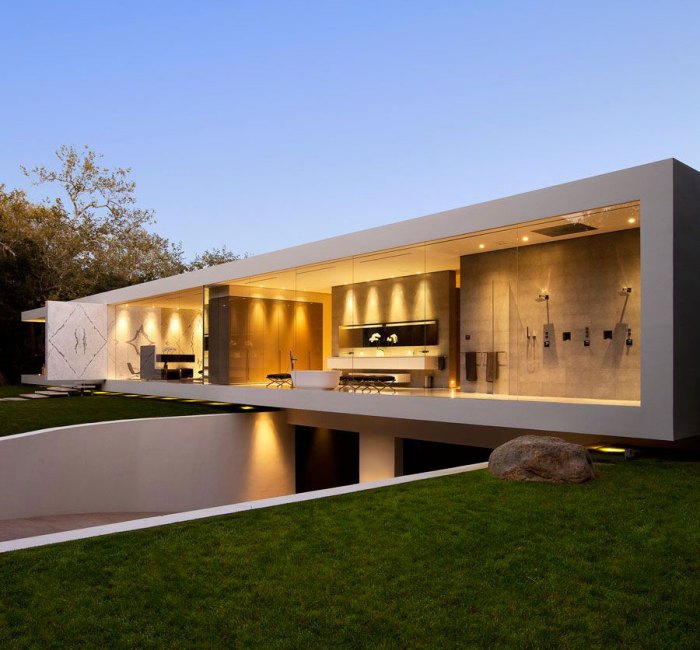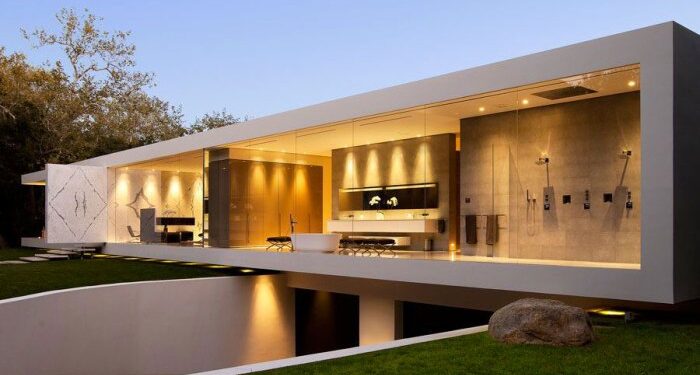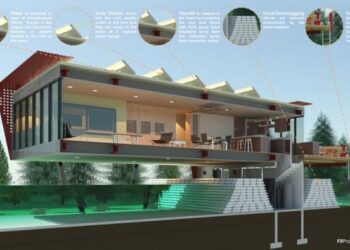Exploring the realm of Minimalist architecture house design ideas, this captivating introduction delves into the beauty of simplicity and functionality in modern living spaces. From clean lines to natural elements, discover how minimalism can transform a house into a sanctuary of tranquility and style.
As we unravel the key principles and characteristics of minimalist architecture, you'll gain insights into creating a harmonious balance between form and function in your home design.
Importance of Minimalist Architecture in House Design
Minimalist architecture is a design approach that emphasizes simplicity, clean lines, and a focus on functionality. This style eliminates unnecessary elements and decorations, creating a sense of calm and serenity in a space.
Key Principles of Minimalist Architecture in House Design
- A focus on simplicity: Minimalist architecture aims to simplify the design by removing unnecessary elements and clutter.
- Clean lines and geometric shapes: Straight lines, simple shapes, and a limited color palette are key elements of minimalist architecture.
- Functionality over decoration: The design prioritizes functionality and practicality, with every element serving a purpose.
- Use of natural light: Minimalist architecture often incorporates large windows and open spaces to maximize natural light and create a sense of openness.
Examples of How Minimalist Architecture Enhances Living Spaces
- Minimalist architecture can make a small space appear larger by eliminating clutter and using a simple color scheme.
- The focus on natural light in minimalist design can create a bright and airy atmosphere in a home, promoting a sense of well-being.
- By prioritizing functionality, minimalist architecture can help create a more organized and efficient living space, reducing stress and promoting a sense of calm.
Characteristics of Minimalist Architecture House Design
Minimalist architecture in house design is characterized by simplicity, functionality, and clean lines. The focus is on stripping away unnecessary elements and embracing a sense of openness and tranquility within the space.
Clean Lines
Clean lines are a hallmark of minimalist architecture, with a focus on simplicity and straight edges. This design element helps create a sense of order and clarity within the space, promoting a feeling of calmness and serenity.
Open Spaces
Minimalist architecture often incorporates open floor plans and spacious layouts, removing barriers and creating a sense of flow throughout the house. This design choice allows for natural light to penetrate the space easily and creates a feeling of expansiveness.
Natural Light
Natural light plays a crucial role in minimalist architecture, as it helps enhance the overall ambiance of the space. Large windows, skylights, and strategically placed openings allow sunlight to filter into the house, creating a warm and inviting atmosphere.
Incorporating Natural Elements in Minimalist House Design

When it comes to minimalist house design, incorporating natural elements like wood, stone, and plants plays a crucial role in creating a harmonious and serene living space. These elements not only add warmth and texture to the design but also bring a sense of connection to the surrounding environment.
Role of Natural Elements
Natural elements such as wood and stone can be used to add a touch of warmth and earthiness to a minimalist house design. Wood can be incorporated through flooring, furniture, or accent walls, while stone can be used for features like fireplace surrounds or countertops.
- Utilize natural materials such as wood and stone for flooring, furniture, and accent walls to add warmth and texture to the minimalist design.
- Integrate plants and greenery throughout the space to bring a sense of nature indoors and promote a feeling of tranquility.
- Use natural light to illuminate the space and create a seamless connection between the indoors and outdoors.
Integrating Natural Light and Greenery
Natural light is a key element in minimalist architecture as it helps to open up the space and create a sense of airiness. Large windows, skylights, and glass doors can be used to maximize natural light and blur the boundaries between indoor and outdoor spaces.
Plants and greenery can be strategically placed throughout the house to add freshness and a pop of color to the minimalist design.
Creating a Seamless Connection
To create a seamless connection between indoor and outdoor spaces in a minimalist house design, consider incorporating features like outdoor patios, decks, or courtyards that flow seamlessly from the interior living areas. Use similar materials and color palettes to maintain a cohesive design aesthetic.
Minimalist Color Schemes and Materials
In minimalist architecture, color schemes and materials play a crucial role in creating a clean, sleek, and uncluttered design aesthetic
Importance of Color Schemes in Minimalist Architecture
Color schemes in minimalist architecture are typically focused on neutral tones such as white, beige, gray, and black. These colors help create a sense of calm and simplicity, while also allowing natural light to bounce off surfaces and brighten up the space.
When choosing colors for a minimalist design, it's important to keep the palette simple and cohesive to maintain the minimalist aesthetic.
Choosing Materials for a Minimalist Design
Materials used in minimalist architecture are often sleek, smooth, and durable. Common materials include glass, steel, concrete, and wood. These materials complement the clean lines and simple forms of minimalist design. When selecting materials for a minimalist house, opt for high-quality finishes that are easy to maintain and have a timeless appeal.
Popular Color Palettes and Materials in Minimalist House Design
Popular color palettes in minimalist house design include:
- White and black: A classic and timeless combination that creates a modern and sophisticated look.
- Neutral tones: Beige, gray, and earthy tones add warmth and depth to a minimalist space.
- Monochromatic schemes: Using variations of a single color creates a cohesive and harmonious design.
As for materials, some popular choices for minimalist house design are:
- Concrete: Provides a sleek and industrial look, adding a modern touch to the space.
- Steel: Offers strength and durability while contributing to the minimalist aesthetic with its clean lines.
- Wood: Adds warmth and texture to a minimalist design, balancing out the sleekness of other materials.
Functional Minimalist Furniture and Decor
Minimalist furniture and decor play a crucial role in achieving the clean, streamlined aesthetic of minimalist architecture. By focusing on functional pieces that serve a purpose and have a simple design, you can create a space that feels open, uncluttered, and calming.
Selecting Functional Furniture Pieces
When choosing furniture for a minimalist house, opt for pieces that are multi-functional and can serve more than one purpose. For example, a sleek storage ottoman can act as both a coffee table and a place to store blankets or magazines.
Look for furniture with clean lines, neutral colors, and minimal embellishments to maintain the minimalist style.
- Consider furniture with hidden storage to keep clutter out of sight.
- Choose pieces with a small footprint to maximize space in a minimalist room.
- Invest in quality furniture that will last for years, rather than trendy pieces that may quickly go out of style.
“Less is More” in Minimalist Decorating
In a minimalist space, the concept of "less is more" rings true. Avoid overdecorating or filling every corner with furniture and decor. Instead, focus on a few key pieces that make a statement and enhance the overall design. Opt for a few carefully chosen decor items, such as a statement plant or a piece of artwork, rather than cluttering the space with unnecessary items.
- Choose decor items that complement the minimalist style, such as geometric shapes or natural materials like wood or stone.
- Keep surfaces clutter-free and only display items that serve a purpose or bring you joy.
- Embrace negative space to allow the furniture and decor you do have to stand out and shine.
Closing Summary
In conclusion, Minimalist architecture house design ideas offer a pathway to a clutter-free, serene living environment that celebrates the essence of less is more. By incorporating natural elements, embracing clean lines, and choosing the right color schemes, you can elevate your living space to a new level of sophistication and elegance.
Detailed FAQs
How does minimalist architecture enhance living spaces?
Minimalist architecture maximizes open spaces, natural light, and clean lines to create a sense of tranquility and simplicity in living areas.
What are some popular color palettes for minimalist house design?
Popular color palettes for minimalist design include monochromatic schemes like black and white, neutral tones like beige and gray, and accents of bold colors like navy or mustard.
Why is the concept of "less is more" important in minimalist spaces?
The idea of "less is more" in minimalist spaces emphasizes the importance of decluttering, focusing on essential elements, and creating a serene environment free from unnecessary distractions.











